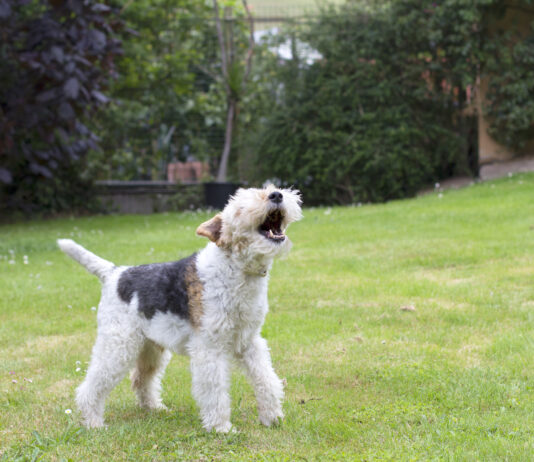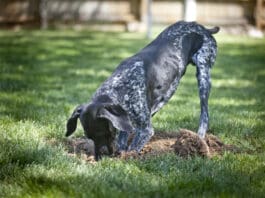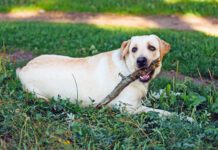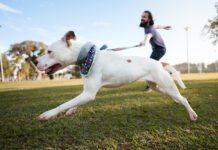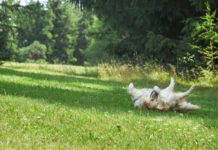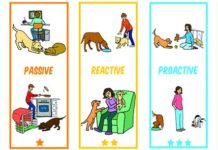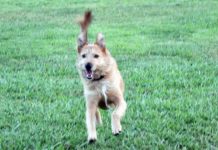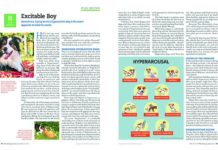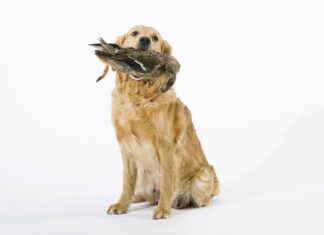Why Do Dogs Eat Dirt?
If your dog is eating large amounts of dirt, she could be suffering from a vitamin or mineral deficiency that she is trying to remedy. Maybe. While there’s a lot of anecdotal support for this theory, research is fairly inconclusive.
How to Comfort a Dog in Heat
An intact dog will go through a heat cycle twice a year. Comforting a dog in heat requires patience and keeping a dog that is confined indoors engaged.
Do Dogs Really Watch TV?
Dogs’ vision is a little different from ours. Despite these differences between dogs’ vision and ours, many dogs watch TV and recognize things that are of interest to them.
Teach Your Dog to Settle and Relax on Cue
If your dog will exhibit calm relaxed behavior when needed, it can help reduce stress and make everyone’s day smoother. When our dogs act calm, they will actually become calmer. Gradually, this state of relaxation will develop to match the outward behavior.
Why Do Dogs Howl?
Howling is one of the many ways that dogs communicate. It can be a territorial declaration, signal excitement at the start of a walk. or just communicating with dogs in the area.
Why Does My Dog Chew on Wood?
Wood chewing is fraught with potential veterinary emergencies, from splinters in the mouth to pieces lodged in the gastrointestinal tract and more. So even though it's natures favorite chew toy it shouldn't be your dogs.
Teach Your Dog to Walk Without Pulling
It might be an exaggeration, but dogs that don't pull seem to be an exception rather than the rule.
Why Do Dogs Roll on Their Backs?
Dogs rolling on their backs is adorable. Repeated rolling though can be a sign of excessive itchiness that might need veterinary care. Dogs also have a habit of rolling in things their owner's might not care to smell or wash out of their fur.
Understanding Canine Compulsive Disorder
Also called compulsive behavior disorder, this is a mental health disorder characterized by the excessive performance of repetitive behaviors that don't serve any apparent purpose
Properly Supervising Dogs
Five types of dog-to-dog supervision, from left to right (or from 1 to 4 stars): No adult supervising dogs; Adult present but distracted; Reacting after the dogs are too close; Having a plan, being prepared; Fully present, adult supervision
Training Your Dog to ‘Wait’ and ‘Stay’
can save your dog's life.
Thanks to Morgan Macy, training assistant at The Canine Connection in Chico, CA, for demonstrating these techniques.üStart teaching the food bowl wait" with the food bowl held high. Look for your dog to shift her eyes from the bowl to your face.üClick (or use another marker) to indicate she's doing it right
Thanks to Morgan Macy, training assistant at The Canine Connection in Chico, CA, for demonstrating these techniques.üStart teaching the food bowl wait" with the food bowl held high. Look for your dog to shift her eyes from the bowl to your face.üClick (or use another marker) to indicate she's doing it right
Letters and Corrections: April 2018
There are many ways to add mental stimulation to a simple game of fetch. For example, we can ask the dog to jump onto a platform and lie down before we throw a disc for him. We can ask him to go through an agility tunnel before catching the ball. The important thing to recognize is when the dog is getting over threshold and stopping the game or reducing its intensity until the dog calms down. If you know the signs of hyperarousal, depicted in the infographic in the original article, then you will be more able to help your dog.


